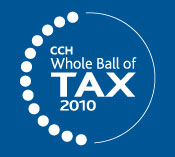| Home | About Us | Order Products | Press Center | Customer Service | Career Opportunities |

CCH can assist you with stories, including interviews with CCH subject experts.
Also, the 2010 CCH provides special CCH Tax Briefings on key topics at: CCHGroup.com/Legislation/Briefings.
|
Standard Deduction Not So Standard Anymore(RIVERWOODS, ILL., January 2010) – Long a fixture of the income tax, the “standard” deduction isn’t so standard anymore, according to CCH, a Wolters Kluwer business and a leading provider of tax, accounting and audit information, software and services (CCHGroup.com). In recent years, Congress has created opportunities for people to expand their “standard" deduction with additional tax breaks while still avoiding the need to itemize. “The original idea of a standard deduction was to be a catchall for the average taxpayer so they could reduce their taxable income without having to fill out Schedule A,” said CCH Principal Federal Tax Analyst Mark Luscombe, JD, LLM, CPA. “To take advantage of some of them, though, people will have to use a brand-new schedule, gaining deductions but not saving on paperwork.” Blindness, Age, Bring Extra DeductionsAdditional standard deductions for the blind and those 65 years and older have been a part of the various 1040 forms for many years. “The idea here simply seems to be that these folks generally are in poorer financial shape and could use a little extra financial help,” Luscombe said. “With a ‘normal’ retirement age now pegged at 66 for Social Security purposes, this assumption may become increasingly questionable, but on the other hand, it’s difficult to see Congress getting rid of this provision.” The amount of this additional standard deduction is $1,100 for 2009, and it can be taken by each person who has reached age 65 by January 1, 2010 and for each person who is blind. So a couple filing jointly, both age 65 or older and both blind, would take an additional $4,400. Property Taxes Can Swell DeductionSince 2008, non-itemizers have nevertheless been able to deduct their state and local property taxes of up to $1,000 for joint filers and $500 for other filers as an additional standard deduction. “The provision was part of a package aimed at shoring up the real estate market,” Luscombe observed. “Much of the package rewarded people for buying homes; some of it protected people who were losing their homes from having to pay additional income tax. This provision generally rewards property owners who have owned their homes for a long time and have little or no opportunity to take itemized deductions related to their homes – because the interest on their mortgages is small, or they have paid their mortgages off.” The deduction expired at the end of 2009, but it is likely to be extended for 2010, Luscombe believes. “The extension was in legislation that passed in the House of Representatives, and is likely to pass in some form or another in the Senate, as well,” Luscombe said. Write Off Losses Without ItemizingAnother provision effective since 2008 allows people who have experienced casualty losses in presidentially declared disaster areas to take them as an additional standard deduction. “This is especially valuable to people who may experience a few thousand dollars in losses that they can ill afford, but whose losses are not large enough to be worth itemizing,” Luscombe noted. This special opportunity is not available to those living in the Midwest Disaster Area of 2008, for whom different rules apply. Buy a New Car, Get a DeductionLast year, yet another opportunity to increase the standard deduction was added by the American Recovery and Reinvestment Act. It provided the opportunity to deduct the state and local sales and excise tax on a new car bought after February 16, 2009, reflecting the effective date of the Act. The ability to take the deduction phases out for joint filers with adjusted gross incomes of $250,000 to $260,000 ($125,000 to $135,000 for other filers) and it’s limited to the taxes attributable to the first $49,500 of the purchase price. “This is not the only way to take the deduction,” Luscombe noted. “If you choose to itemize, you can take it as part of your taxes-paid deduction, as long as you don’t also claim a deduction for your general state and local sales tax.” A New Schedule for the Standard DeductionThe expansion of the “standard” deduction sections of Form 1040 and 1040A will certainly benefit many taxpayers, but as is often the case, the gain comes with a certain amount of pain – in this case, the need to fill out a brand new schedule, Schedule L. “For some people, filling out this schedule will probably entail as much figuring as taking a few itemized deductions on Schedule A,” Luscombe said. Why Complicate the Standard Deduction?Rather than add complexity to the standard deduction, why not add items to the existing list of “above-the-line” deductions, taken on the first page of Form 1040 and 1040A? Space may be one issue. There is little room for extra lines on the first page of the forms, and even now some above-the-line deductions lack readily identifiable lines. But Luscombe pointed out another reason not to use the above-the-line approach. “Above-the-line deductions avoid the need to itemize, but they have wider effects than legislators may really want,” Luscombe said. “For example, lowering adjusted gross income through an above-the-line deduction can make the taxpayer more eligible for certain credits and other benefits that have income-based phaseouts.” About CCH, a Wolters Kluwer businessCCH, a Wolters Kluwer business (CCHGroup.com) is a leading provider of tax, accounting and audit information, software and services. It has served tax, accounting and business professionals since 1913. CCH is based in Riverwoods, Ill. Wolters Kluwer is a leading global information services and publishing company. Wolters Kluwer is headquartered in Alphen aan den Rijn, the Netherlands (www.wolterskluwer.com). -- ### -- nb-10-16
|
© 2024, CCH INCORPORATED. All rights reserved. |
Back to Top | Print this Page | ||||||||||||||||||